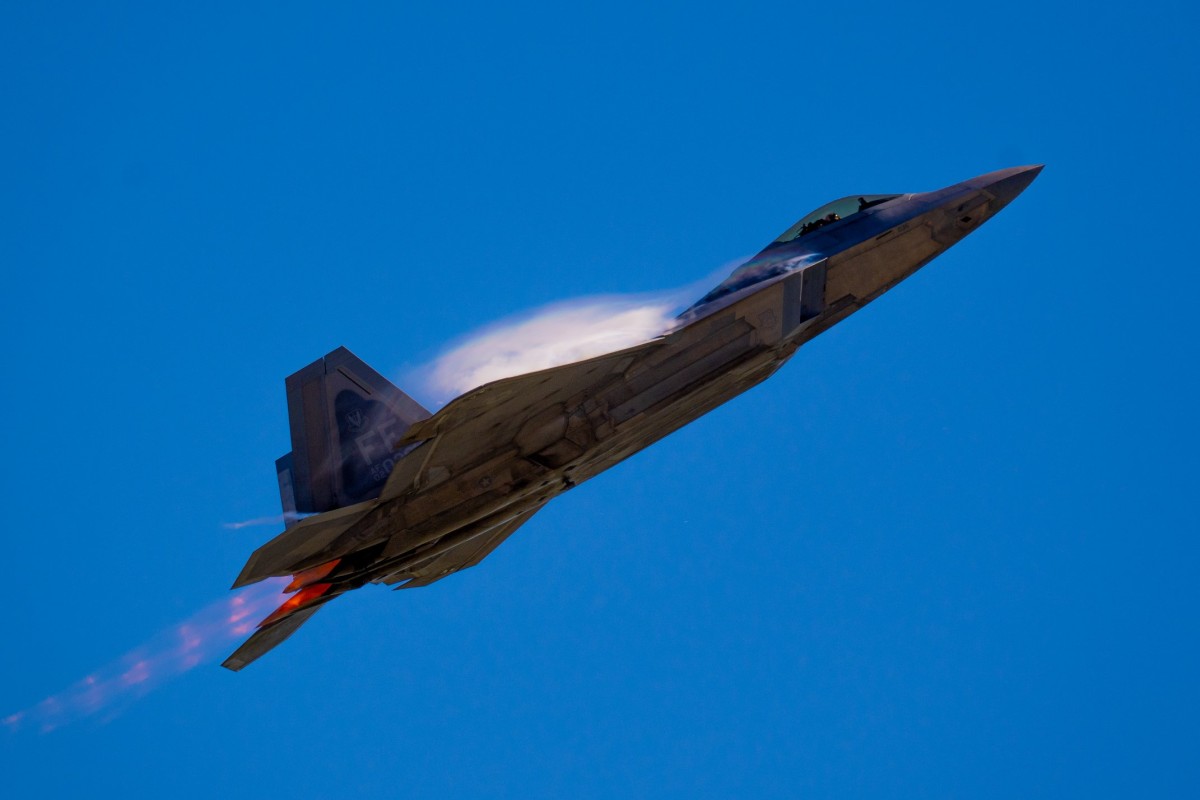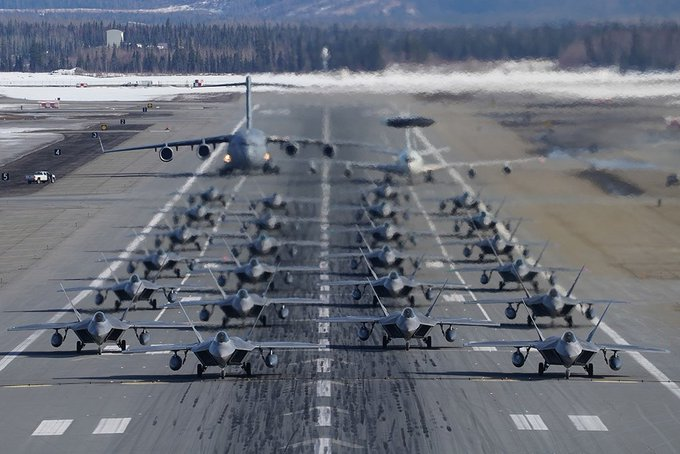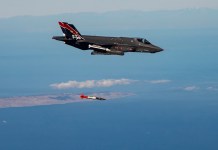China appears to be taking serious steps to prepare for a possible confrontation with the United States. As the EurAsian Times reported earlier, the People’s Liberation Army (PLA) is blowing up mock-ups of US frontline fighter jets such as the F-35 Lightning II and F-22 Raptors.

Experts believe the mock targets could be aimed at striking Alaska, Guam, or Hawaii Air Force bases. Alaska is perceived to be most important as it is the hub of F-22 stealth fighters, experts believe.
Recent satellite imagery revealed that China has been rehearsing precision strike drills to annihilate scaled-down models of American fighter jets. The satellite images showed charred F-35s and F-22s positioned at one end of a lengthy runway in what appears to be the aftermath of the Chinese attack.
The images, reportedly taken by Google Earth on May 29, show over 20 scale models of jets that mimic US stealth fighters and a miniature aircraft carrier. Some military bloggers and open-source intelligence accounts on social media suggested that the location of these photos was Qakilik in the Taklamakan Desert.
China regularly conducts drills at the Taklamakan desert in Xinjiang province. The target range complex has several military testing sites. Three years ago, photos provided to USNI News by satellite imagery company Maxar revealed that China had built models of an American Ford-class aircraft carrier and two Arleigh Burke-class destroyers.
Likewise, the presence of US fifth-generation stealth aircraft models in Xinjiang has led experts to conclude that the PLA has been rehearsing destroying them before they get airborne. This clearly indicates China’s strategy of conducting pre-emptive strikes and eliminating the USAF’s best fighters if a conflict were to trigger.
This development is significant given that both F-22 and F-35 stealth aircraft are believed to be the fighter jets of choice for the US Air Force (USAF) in a potential conflict against China in the Indo-Pacific. Experts believe these stealth jets will be able to infiltrate China’s airspace, which is protected by an advanced Anti-Access/Area Denial (A2/AD) system, to carry out attacks.
A recently published EurAsian Times report explained how the F-35 Lightning II that Indo-Pacific allies of the US have now amassed would be deployed against China in a regional conflict. The F-35 is believed to be highly adaptable, posing a considerable threat to the Chinese PLA, especially as it could be deployed in massive numbers.
However, the F-22 Raptor, despite being fewer in numbers is also a force to reckon with and has been projected by the USAF as the most advanced stealth aircraft in the world. In fact, the threat posed by F-22 Raptors has been acknowledged by Chinese military analysts and its state-owned media on multiple occasions.
China Might Want To Destroy F-22 Raptors In Alaska
The USAF deployed its F-22 Raptors to Japan’s Kadena Air Base in March 2024. In response, China deployed its J-20 Mighty Dragon stealth jets to an airbase located 600 miles away from Kadena, sending a clear message to its adversary.
Over the past few years, China has shown a heightened interest in evaluating its military technology in comparison to the F-22 Raptor. Chinese military innovations, ranging from claims of cutting-edge quantum radar systems to ground-to-air hypersonic missiles, have often been compared to the capabilities of the F-22.
Many Chinese analysts consider the F-22 Raptors the biggest threat to the PLA. These double-engine, super-stealthy fighters could bomb out critical Chinese military infrastructure before their radars could detect them. This could also mean that the Chinese would prefer to destroy the Raptors ‘while they are asleep.’
Such a theory was floated by Hong Kong-based military commentator Leung Kwok-leung quoted by the South China Morning Post. Leung said the images hint at a possible strike at Alaska, where most F-22 Raptors are stationed.
“Alaska is also the base of the most important national missile defense system in the United States. Last year, an F-22 was used to shoot down China’s so-called spy balloon, which shows that the F-22 also undertakes the task of the missile defense system,” Leung said.
Alaska’s strategic location makes it a vital US military outpost. Situated at the crossroads of the Pacific and Arctic regions, it offers unprecedented access and surveillance capabilities over both oceans. Its vital geographical location allows the USAF to quickly scramble fighters to intercept hostile warplanes.

The USAF frequently deploys the F-22 Raptor as a show of force against its adversaries and a bid to project power to them. In 2019, during the Polar Force exercise at Joint Base Elmendorf-Richardson, Alaska, the US Air Force conducted an “elephant walk” featuring 24 F-22 Raptors.

Despite never having engaged in combat since going into service, the USAF selected the F-22 Raptor to shoot down a Chinese surveillance balloon hovering over the continental United States last year. It was the first time that a Raptor fired a missile and struck a target, although Beijing maintained that the balloon was benign.
Moreover, in April 2024, the USAF conducted a seven-day exercise operating its F-22A Raptors and aircraft from austere, basic airfields in the western Pacific’s Guam and Mariana Islands. This was largely seen as a combat preparation against China. As experts have noted, the idea is to spread out, get close, and fight China inside its anti-access/area-denial (A2/AD) bubble.
Notably, the F-22s from Joint Base Elmendorf-Richardson (JBER) Alaska and Joint Base Pearl Harbor-Hickam (JBPHH) Hawaii flew across the Pacific for the exercise.
As part of these drills, the 3rd Air Expeditionary Wing from Joint Base Elmendorf-Richardson (JBER) Alaska “conducted simulated combat situations and tested agility in deploying combat air power across the expansive Indo-Pacific region,” underscoring the importance of Raptors stationed far away in Alaska and positioning them as a threat to the Chinese military.
- Contact the author at sakshi.tiwari9555 (at) gmail.com
- Follow EurAsian Times on Google News




